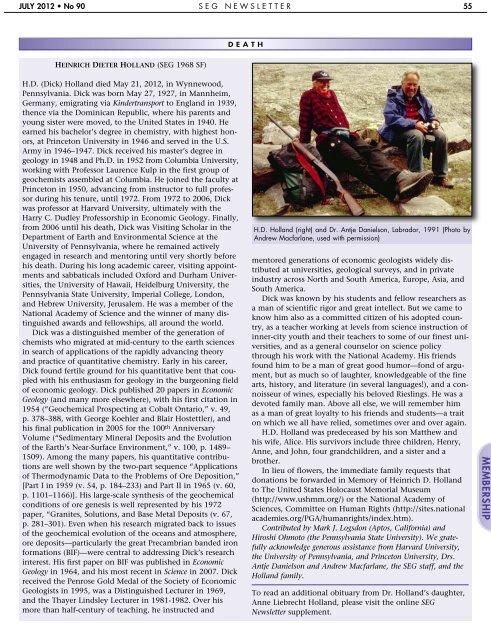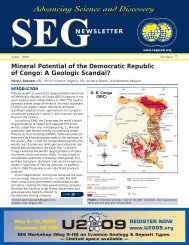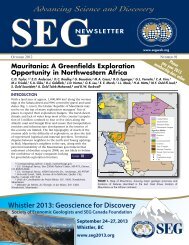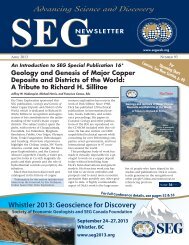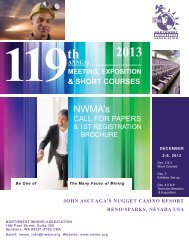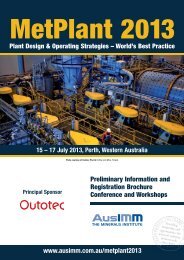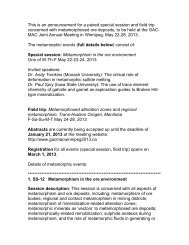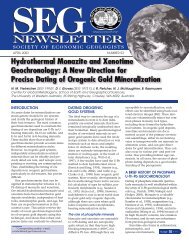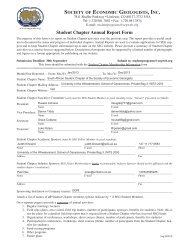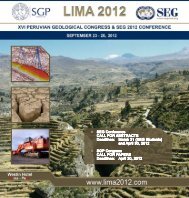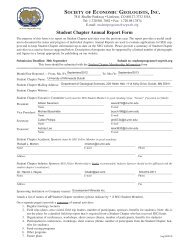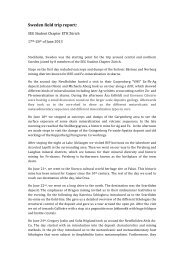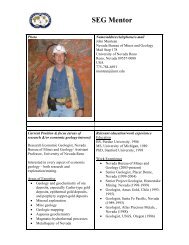SEG - Society of Economic Geologists
SEG - Society of Economic Geologists
SEG - Society of Economic Geologists
You also want an ePaper? Increase the reach of your titles
YUMPU automatically turns print PDFs into web optimized ePapers that Google loves.
JULY 2012 • No 90 <strong>SEG</strong> NEWSLETTER 55<br />
DEATH<br />
HEINRICH DIETER HOLLAND (<strong>SEG</strong> 1968 SF)<br />
H.D. (Dick) Holland died May 21, 2012, in Wynnewood,<br />
Pennsylvania. Dick was born May 27, 1927, in Mannheim,<br />
Germany, emigrating via Kindertransport to England in 1939,<br />
thence via the Dominican Republic, where his parents and<br />
young sister were moved, to the United States in 1940. He<br />
earned his bachelor’s degree in chemistry, with highest honors,<br />
at Princeton University in 1946 and served in the U.S.<br />
Army in 1946–1947. Dick received his master’s degree in<br />
geology in 1948 and Ph.D. in 1952 from Columbia University,<br />
working with Pr<strong>of</strong>essor Laurence Kulp in the first group <strong>of</strong><br />
geochemists assembled at Columbia. He joined the faculty at<br />
Princeton in 1950, advancing from instructor to full pr<strong>of</strong>essor<br />
during his tenure, until 1972. From 1972 to 2006, Dick<br />
was pr<strong>of</strong>essor at Harvard University, ultimately with the<br />
Harry C. Dudley Pr<strong>of</strong>essorship in <strong>Economic</strong> Geology. Finally,<br />
from 2006 until his death, Dick was Visiting Scholar in the<br />
Department <strong>of</strong> Earth and Environmental Science at the<br />
University <strong>of</strong> Pennsylvania, where he remained actively<br />
engaged in research and mentoring until very shortly before<br />
his death. During his long academic career, visiting appointments<br />
and sabbaticals included Oxford and Durham Univer -<br />
sities, the University <strong>of</strong> Hawaii, Heidelburg University, the<br />
Pennsylvania State University, Imperial College, London,<br />
and Hebrew University, Jerusalem. He was a member <strong>of</strong> the<br />
National Academy <strong>of</strong> Science and the winner <strong>of</strong> many distinguished<br />
awards and fellowships, all around the world.<br />
Dick was a distinguished member <strong>of</strong> the generation <strong>of</strong><br />
chemists who migrated at mid-century to the earth sciences<br />
in search <strong>of</strong> applications <strong>of</strong> the rapidly advancing theory<br />
and practice <strong>of</strong> quantitative chemistry. Early in his career,<br />
Dick found fertile ground for his quantitative bent that coupled<br />
with his enthusiasm for geology in the burgeoning field<br />
<strong>of</strong> economic geology. Dick published 20 papers in <strong>Economic</strong><br />
Geology (and many more elsewhere), with his first citation in<br />
1954 (“Geochemical Prospecting at Cobalt Ontario,” v. 49,<br />
p. 378–388, with George Koehler and Blair Hostettler), and<br />
his final publication in 2005 for the 100 th Anniversary<br />
Volume (“Sedimentary Mineral Deposits and the Evolution<br />
<strong>of</strong> the Earth’s Near-Surface Environment,” v. 100, p. 1489–<br />
1509). Among the many papers, his quantitative contributions<br />
are well shown by the two-part sequence “Applications<br />
<strong>of</strong> Thermodynamic Data to the Problems <strong>of</strong> Ore Deposition,”<br />
[Part I in 1959 (v. 54, p. 184–233) and Part II in 1965 (v. 60,<br />
p. 1101–1166)]. His large-scale synthesis <strong>of</strong> the geochemical<br />
conditions <strong>of</strong> ore genesis is well represented by his 1972<br />
paper, “Granites, Solutions, and Base Metal Deposits (v. 67,<br />
p. 281–301). Even when his research migrated back to issues<br />
<strong>of</strong> the geochemical evolution <strong>of</strong> the oceans and atmosphere,<br />
ore deposits—particularly the great Precambrian banded iron<br />
formations (BIF)—were central to addressing Dick’s research<br />
interest. His first paper on BIF was published in <strong>Economic</strong><br />
Geology in 1964, and his most recent in Science in 2007. Dick<br />
received the Penrose Gold Medal <strong>of</strong> the <strong>Society</strong> <strong>of</strong> <strong>Economic</strong><br />
<strong>Geologists</strong> in 1995, was a Distinguished Lecturer in 1969,<br />
and the Thayer Lindsley Lecturer in 1981-1982. Over his<br />
more than half-century <strong>of</strong> teaching, he instructed and<br />
H.D. Holland (right) and Dr. Antje Danielson, Labrador, 1991 (Photo by<br />
Andrew Macfarlane, used with permission)<br />
mentored generations <strong>of</strong> economic geologists widely distributed<br />
at universities, geological surveys, and in private<br />
industry across North and South America, Europe, Asia, and<br />
South America.<br />
Dick was known by his students and fellow researchers as<br />
a man <strong>of</strong> scientific rigor and great intellect. But we came to<br />
know him also as a committed citizen <strong>of</strong> his adopted country,<br />
as a teacher working at levels from science instruction <strong>of</strong><br />
inner-city youth and their teachers to some <strong>of</strong> our finest universities,<br />
and as a general counselor on science policy<br />
through his work with the National Academy. His friends<br />
found him to be a man <strong>of</strong> great good humor—fond <strong>of</strong> argument,<br />
but as much so <strong>of</strong> laughter, knowledgeable <strong>of</strong> the fine<br />
arts, history, and literature (in several languages!), and a connoisseur<br />
<strong>of</strong> wines, especially his beloved Rieslings. He was a<br />
devoted family man. Above all else, we will remember him<br />
as a man <strong>of</strong> great loyalty to his friends and students—a trait<br />
on which we all have relied, sometimes over and over again.<br />
H.D. Holland was predeceased by his son Matthew and<br />
his wife, Alice. His survivors include three children, Henry,<br />
Anne, and John, four grandchildren, and a sister and a<br />
brother.<br />
In lieu <strong>of</strong> flowers, the immediate family requests that<br />
donations be forwarded in Memory <strong>of</strong> Heinrich D. Holland<br />
to The United States Holocaust Memorial Museum<br />
(http://www.ushmm.org/) or the National Academy <strong>of</strong><br />
Sciences, Committee on Human Rights (http://sites.national<br />
academies.org/PGA/humanrights/index.htm).<br />
Contributed by Mark J. Logsdon (Aptos, California) and<br />
Hiroshi Ohmoto (the Pennsylvania State University). We gratefully<br />
acknowledge generous assistance from Harvard University,<br />
the University <strong>of</strong> Pennsylvania, and Princeton University, Drs.<br />
Antje Danielson and Andrew Macfarlane, the <strong>SEG</strong> staff, and the<br />
Holland family.<br />
To read an additional obituary from Dr. Holland’s daughter,<br />
Anne Liebrecht Holland, please visit the online <strong>SEG</strong><br />
Newsletter supplement.<br />
MEMBERSHIP


